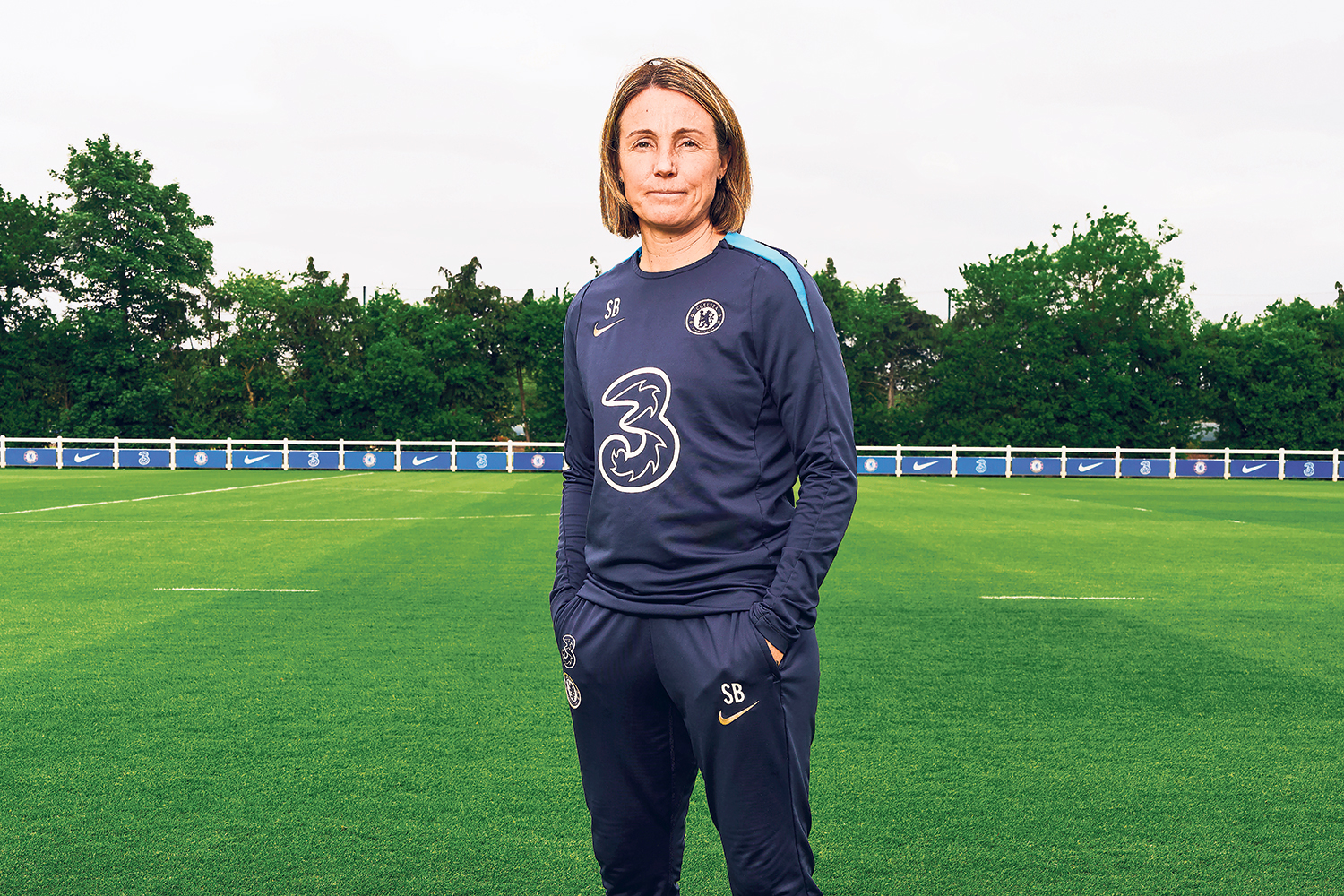On Sunday, Sonia Bompastor has the opportunity to complete the greatest women’s domestic season in history. Her Chelsea side have already won the Women’s Super League without losing a single game, as well as the League Cup. Only Manchester United stand in their way of an unbeaten domestic treble.
The 43-year-old French manager has exceeded expectations in her first season managing Chelsea. Yet given it is the sixth consecutive WSL title the club have won, there has also been a sense that outside of the club, enthusiasm for Chelsea’s success is dampening.
“It’s human,” she says, speaking to The Observer at Chelsea’s training ground in Cobham. “It was the same in France. Everyone was trying to find ways to change the game just for Lyon not to win the league, because people were fed up with it.
“But we also need to recognise Chelsea are doing the right thing in women’s football. We have people who believe in the women’s team, who invest in the women’s team. Other people should have the goal of catching up with Chelsea.”
Bompastor is used to being at the forefront of the women’s game. Her first club Montpellier were one of the original teams to invest in French women’s football, before she moved to Lyon where Jean-Michel Aulas financed a team that would go on to dominate the women’s game.
Her trophy cabinet is full to the brim. Eight league titles as a player in France along with two Champions Leagues. Another Champions League as a manager, and a league title won in every full season she has coached.
“I feel in my life I have always been in the right place at the right moment. I was lucky enough to meet the right people. It’s difficult for me to say why, I don’t know how to explain it.” Her success as a player came with an intensity and drive that some found scary. Former Lyon teammate Kenza Dali said she used to try to avoid being on Bompastor’s side in training because she was so demanding.
“I feel bad because it was too much. I couldn’t accept mistakes when I was a player. I didn’t understand why sometimes my teammates were not focused or not practising with the right mentality.
“Sometimes I would yell at them and the day after I would have to apologise. I didn’t care if they were crying. But it describes who I was as a player, and also a bit who I am as a manager.”
Having children has helped Bompastor mellow, as well as an awareness that the demands on players have changed significantly since her own playing days. She has four children with her partner and assistant manager, Camille Abily.
Newsletters
Choose the newsletters you want to receive
View more
For information about how The Observer protects your data, read our Privacy Policy
“Sometimes I’m upset because my kids are not listening to me and the instant after, you show them the love you have for them. It’s almost the same with your players”
The balance between being a mother and a manager is not always easy, although Bompastor insists she likes having “two intense jobs”.
“One of our kids is struggling with her confidence. She goes to an after-school club and this morning she was crying. She was like, ‘I don’t want to go myself, I’m not confident enough, I’m afraid you are not going to pick me up.’ And I was dealing with that this morning at breakfast. Half of me was like, ‘Come on, be tough, it’s nothing.’ And also I was heartbroken because for her, it’s a big thing. And you have to deal with that and come into your job and pretend nothing happened this morning.”
Bompastor’s own approach to motherhood has been influenced by her experience of her mother passing away when she was 22. At the time, Bompastor was working and training at Clairefontaine, the French national football academy.
‘I felt I prioritised football instead of staying at home with my mum. For a long time, I hated football’
‘I felt I prioritised football instead of staying at home with my mum. For a long time, I hated football’
“I will always remember when my brother phoned and he told me my mum was dead. It’s difficult to describe what you feel in that moment. You can’t believe it. I was destroyed.
“I felt really guilty because I left home young and I felt I was selfish. I felt like I was thinking about me instead of enjoying time with my mum, because when I realised she was not there any more I felt like I had prioritised football instead of staying home with her. For a long time, I hated football.
“I remember all these moments when I was going from home to college and my mum was dropping me at the train station. When the train was leaving she was running alongside it and I was like: ‘Mum don’t do that.’ I was so embarrassed, and now being a mum I understand why she was doing that.
“My daughter had a play at school and we went to see her performance. And she was like, ‘Mummy listen to me. You sit on the chair, you don’t look at me, you don’t blow kisses.’ And I was like, ‘Wow I was saying the same to my mum!’ But when you are a kid, you don’t realise that.
“Even now when I’m talking about it, it’s still difficult because I feel like I couldn’t enjoy time with her. We are a family where it is really difficult for us to say ‘I love you’. So my mum left without me being able to say these small words, and it’s still difficult for me to say that to my dad.” Bompastor believes that experience helped her become the person she is today, as a manager and a mother. She describes herself as someone who is open to criticism.
“One of my strengths is I don’t care when people come to me and say ‘This is what you need to improve. This is what you need to do to be a better person, a better coach’ You can always learn, at any age.
“So actually I like when people around me are direct and honest. For me, just to be able to sit with someone who is able to tell me the truth, it’s fine.”
Where does that strength come from? “I have a good level of confidence because I’m the first one to always question myself. I don’t have any fear of saying I was wrong. If someone proved to me I was doing the wrong thing, it’s OK for me to recognise that even if it has to come from a player, from another member of staff or anyone else. I trust my experience.
“When you are someone who has this level of confidence, you don’t fear people because you know you will always find a solution. That’s who I am as a person.”
As Bompastor’s first season at Chelsea winds down, it is clear she is already hungry to improve the team further.
A Champions League semi-final loss to Barcelona was a big disappointment, with Bompastor refusing to shy away from the fact that winning that trophy is her aim.
“As a new manager, it’s difficult to work on every aspect in your first season. I can identify a lot of room for improvement in different areas. I have already started to share that with the right people to make sure for next season, we take another step forward.”
And if Chelsea win on Sunday, will she see it as the best ever domestic season by an English team?
“Probably yes,” she admits. “But we still have one more to win. So I’m really focused on that.”
Photograph by Suki Dhanda/ The Observer

